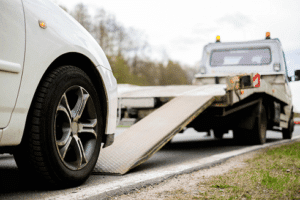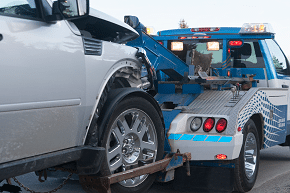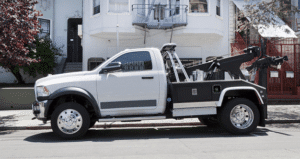We have all seen wreckers running hot with their lights flashing as they race at excessive speeds, weaving in and out of traffic trying to be first to the scene of an accident. The very business model of being a wrecker driver encourages speeding and reckless driving to get there first. Then, there’s the traffic jam that follows as numerous wreck drivers pour onto an accident scene and potentially create new driving hazards for unaware approaching motorists. There are regulations aimed at keeping them out of the way of traffic, but, as you know, rules are not always followed. If you have been in a crash with a wrecker, give us a call to speak to a wrecker accident attorney and discuss your legal options. (713) 932-0777.
Who is Liable for a Wrecker Accident?
When an accident is caused by a wrecker driver’s negligence, the wrecker driver and his employer may have liability. Some wrecker drivers work for themselves while others work for a towing and storage company, a repair shop, or even a service station. Whomever the employer, if the wrecker driver works for a company, then the company is vicariously liable for his negligent actions while he is acting in the course and scope of his work. Additionally, as a common carrier, he is held to a higher standard fo care than an ordinary person.
What are the Common Causes of Wrecker Accidents?

Here are some of the most common causes of wrecker accidents:
- wreckers speeding or driving recklessly to get there first
- drowsy driving due to working excessive hours
- parking in a place that is not safe or impedes traffic
- failure to use proper warning signage,
- failure to secure the tow properly
- other motorists not paying attention and/or operating their vehicles under the influence of alcohol or drugs.
In addition to the above, common causes of accidents such as a simple unsafe lane change or failure to check a blind spot can result in a wrecker accident.
What Should I Do After a Wrecker Accident?
If you are in an accident with a wrecker, you should:
- Assess any injuries.
- If you can do so safely, move out of the moving lanes of traffic.
- Call 911 and report the accident, request police assistance, and request an ambulance, if required.
- Write down any eyewitness information you can gather.
- Take photos of the vehicles and the scene if it can be done safely.
- Make a note of the identifying information that wrecker drivers must legally display on the side of their vehicle. This includes the permit holder’s name, the permit holder’s publicly listed phone number, the permit holder’s city and state, and; the permit number for the wrecker.
Being in an accident with a wrecker can be very frightening. It can be easy to forget important things that need to be done. Try to remain calm. Once the police arrive, you can obtain an incident report number from the investigating officer. After you have attended to your medical needs and are in a stable situation, contact our wrecker accident attorneys for a free consultation.
Types of Wreckers
 Although there is some variation, there are five basic types of wreckers. The five types are:
Although there is some variation, there are five basic types of wreckers. The five types are:
- Hook and Chain Wrecker. – This is the common 1-ton wrecker with a wench that uses chains with a hook to tow vehicles and other things. The chains can scrape up a paint job if the wrecker driver is not careful.
- Wheel-Lift Wrecker. This wrecker is very similar to the hook and chain wrecker, but the chains fasten to a device that looks like a yoke but slides up under the car and fastens underneath. The front end of the car is then lifted off the ground for towing.
- Flatbed Wrecker. A flatbed wrecker is very good for cars. It has a flatbed and ramps that can be lowered so that the vehicle being towed can be pulled up the ramp and onto the wrecker bed by a hydraulic cylinder.
- Rollback Wrecker. A rollback wrecker is the same basic design as a flatbed wrecker except the bed moves back and then tilts so that the rear end lowers down the ground for loading the vehicle. The wrecker bed becomes the ramp.
- Heavy-Duty Wreckers. Heavy-duty wreckers (integrated wreckers) are wreckers used for towing large commercial motor vehicles such as buses or 18-wheeler cabs. They are much sturdier than the typical wrecker and have an extra axle for support.
Each type of wrecker operates a little differently and has its risks. The driver needs to be familiar with the one he has been assigned.
Harris County Wrecker Regulations
County regulations can be very helpful in proving negligence on the part of the wrecker driver. Harris County has its own set of requirements for wrecker operators that accept tows from law enforcement. This is separate from the State’s rules and regulations. All drivers accepting tows in response to calls by law enforcement must have a valid permit issued by Harris County and a Chip. Harris County Towing Ordinance Section II(A)(1). They are further required to comply with several ordinances aimed at preventing accidents and injuries via negligent operation. Some of these include:
- Wrecker drivers cannot have unlicensed weapons, drugs, or alcohol while operating a wrecker. Harris County Tow Truck Ordinance (HCTTO) Section II(H)(5).
- Except in an emergency or at the direction of a Law Enforcement Officer, a Tow Operator shall park the wrecker at least 100 feet from a Law Enforcement Scene. HCTTO Section IV(B)(1).
- A wrecker operator may only use beacon lights as directed by state law. HCTTO Section IV(B)(1).
- The tow operator shall park the wrecker on the same side of the road as the damaged Motor Vehicle. HCTTO Section IV(B)(2)
These regulations are very useful in establishing negligence in a wrecker collision case in Harris County. Often, other counties will have similar Ordinances that can be used to prove liability in your case.
What Are Wrecker Insurance Requirements?

Interstate wrecker requirements are $750,000. Intrastate wrecker requirements are set by the state. In Texas, it is $300,000 for private wreckers and $500,000 if the wrecker tows vehicles at the request of law enforcement.
Interstate Wreckers
Wreckers are generally intrastate vs interstate motor carriers. This means they typically do not do business across state lines. However, the heavy wreckers are sometimes interstate motor carriers because they may have to travel across state lines to retrieve 18-wheelers. If the wrecker in question is involved in interstate trucking, then they will have to maintain a minimum of $750,000 in insurance.
Texas Intrastate Wreckers
If the wrecker you are in a collision with is only involved in intrastate trucking, then there are both state and local county (and in some cases city) ordinances that may apply. Under the Texas Administrative Code Section 86.400(d), wreckers are treated differently based on whether they are engaged in “incident management towing,” or not. Incident management refers to vehicles being towed from public streets at the permission or request of law enforcement rather than private for-hire towing.
If the wrecker is conducting a tow under “incident management towing,” then the wrecker must maintain a minimum of $500,000.00 per incident in liability insurance. If not, then it must carry a minimum of $300,000.00 in liability insurance coverage per incident. Additionally, there must be $50,000 additional coverage to protect the cargo. See 16 Texas Administrative Code 86.400(d).
Harris County Wrecker Requirements
The minimum insurance requirements for each wrecker set by Harris County are the same for towers that accept tows from law enforcement. These requirements are as follows: a. A minimum of $500,000 liability insurance per wrecker per incident, which is combined single limit liability for bodily injury to or death of an individual per occurrence, loss or damage (excluding cargo) per occurrence, or both. b. HCTTO Section II(H)(5).
What Can a Wrecker Accident Lawyer Do for Me?
A wrecker accident lawyer can investigate the driving history and licensing history of the vehicle to determine what insurance regulations apply. He can take action to preserve the wrecker and any potential evidence that may be necessary to prove your case. Furthermore, having a lawyer on your side after a wrecker accident means you get legal advice pertaining to obtaining medical care and presenting a claim, and you get a lawyer advocating your rights and claims against the wrecker company who understands the tricks the risk management adjuster for the company might use to try to devalue or deny your claim.
Speak to a Wrecker Accident Attorney
If you have been injured due to a collision caused by a wrecker, whether the wrecker driver was speeding to get to an accident, parked in an unsafe place, or just not paying attention, you need to talk to a skilled truck accident attorney you can trust. Call Simmons and Fletcher, P.C. at (713) 932-0777 today. We have lawyers who are experienced with wrecker accidents. The consultation is free and we charge you no attorney’s fees not expenses unless we make a recovery in your case.

